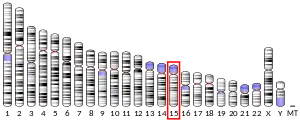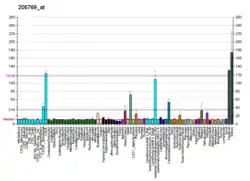Very long-chain acyl-CoA synthetase
Very long-chain acyl-CoA synthetase is an enzyme that in humans is encoded by the SLC27A2 gene.[5][6]
The protein encoded by this gene is an isozyme of long-chain fatty-acid-coenzyme A ligase family. Although differing in substrate specificity, subcellular localization, and tissue distribution, all isozymes of this family convert free long-chain fatty acids into fatty acyl-CoA esters, and thereby play a key role in lipid biosynthesis and fatty acid degradation. This isozyme activates long-chain, branched-chain and very long chain fatty acids containing 22 or more carbons to their CoA derivatives. It is expressed primarily in liver and kidney, and is present in both endoplasmic reticulum and peroxisomes but not in mitochondria. Its decreased peroxisomal enzyme activity is in part responsible for the biochemical pathology in X-linked adrenoleukodystrophy.[6]
See also
References
- GRCh38: Ensembl release 89: ENSG00000140284 - Ensembl, May 2017
- GRCm38: Ensembl release 89: ENSMUSG00000027359 - Ensembl, May 2017
- "Human PubMed Reference:". National Center for Biotechnology Information, U.S. National Library of Medicine.
- "Mouse PubMed Reference:". National Center for Biotechnology Information, U.S. National Library of Medicine.
- Wakui K, Aoyama T, Uchiyama A, Hashimoto T, Fukushima Y (Oct 1998). "Assignment of human fatty-acid-coenzyme A ligase, very long-chain 1 gene (FACVL1) to human chromosome band 15q21.2 by fluorescence in situ hybridization". Cytogenet Cell Genet. 81 (3–4): 292–3. doi:10.1159/000015051. PMID 9730624. S2CID 46774274.
- "Entrez Gene: SLC27A2 solute carrier family 27 (fatty acid transporter), member 2".
Further reading
- Perez VM, Gabell J, Behrens M, Wase N, DiRusso CD, Black PN (2020). "Deletion of fatty acid transport protein 2 (FATP2) in the mouse liver changes the metabolic landscape by increasing the expression of PPAR-regulated genes". J. Biol. Chem. 295 (17): 5737–5750. doi:10.1074/jbc.RA120.012730. PMC 7186177. PMID 32188695.
- Maruyama K, Sugano S (1994). "Oligo-capping: a simple method to replace the cap structure of eukaryotic mRNAs with oligoribonucleotides". Gene. 138 (1–2): 171–4. doi:10.1016/0378-1119(94)90802-8. PMID 8125298.
- Uchiyama A, Aoyama T, Kamijo K, et al. (1997). "Molecular cloning of cDNA encoding rat very long-chain acyl-CoA synthetase". J. Biol. Chem. 271 (48): 30360–5. doi:10.1074/jbc.271.48.30360. PMID 8939997.
- Suzuki Y, Yoshitomo-Nakagawa K, Maruyama K, et al. (1997). "Construction and characterization of a full length-enriched and a 5'-end-enriched cDNA library". Gene. 200 (1–2): 149–56. doi:10.1016/S0378-1119(97)00411-3. PMID 9373149.
- Hirsch D, Stahl A, Lodish HF (1998). "A family of fatty acid transporters conserved from mycobacterium to man". Proc. Natl. Acad. Sci. U.S.A. 95 (15): 8625–9. Bibcode:1998PNAS...95.8625H. doi:10.1073/pnas.95.15.8625. PMC 21126. PMID 9671728.
- Steinberg SJ, Wang SJ, Kim DG, et al. (1999). "Human very-long-chain acyl-CoA synthetase: cloning, topography, and relevance to branched-chain fatty acid metabolism". Biochem. Biophys. Res. Commun. 257 (2): 615–21. doi:10.1006/bbrc.1999.0510. PMID 10198260.
- Watkins PA, Pevsner J, Steinberg SJ (2000). "Human very long-chain acyl-CoA synthetase and two human homologs: initial characterization and relationship to fatty acid transport protein". Prostaglandins Leukot. Essent. Fatty Acids. 60 (5–6): 323–8. doi:10.1016/S0952-3278(99)80007-6. PMID 10471116.
- Steinberg SJ, Wang SJ, McGuinness MC, Watkins PA (1999). "Human liver-specific very-long-chain acyl-coenzyme A synthetase: cDNA cloning and characterization of a second enzymatically active protein". Mol. Genet. Metab. 68 (1): 32–42. doi:10.1006/mgme.1999.2883. PMID 10479480.
- Mihalik SJ, Steinberg SJ, Pei Z, et al. (2002). "Participation of two members of the very long-chain acyl-CoA synthetase family in bile acid synthesis and recycling". J. Biol. Chem. 277 (27): 24771–9. doi:10.1074/jbc.M203295200. PMID 11980911.
- Strausberg RL, Feingold EA, Grouse LH, et al. (2003). "Generation and initial analysis of more than 15,000 full-length human and mouse cDNA sequences". Proc. Natl. Acad. Sci. U.S.A. 99 (26): 16899–903. Bibcode:2002PNAS...9916899M. doi:10.1073/pnas.242603899. PMC 139241. PMID 12477932.
- Ota T, Suzuki Y, Nishikawa T, et al. (2004). "Complete sequencing and characterization of 21,243 full-length human cDNAs". Nat. Genet. 36 (1): 40–5. doi:10.1038/ng1285. PMID 14702039.
This article incorporates text from the United States National Library of Medicine, which is in the public domain.





